Giáo trình Kỹ thuật chế biến món ăn - Ngoại ngữ chuyên ngành
KEY VOCABULARY
bitter fresh recipe
fried shrimps bland fruity
bratt pan seasoned green mustard
cabbage champagne cheeses
chicken Kiev smooth juicy
kang kong solid sour
lamb crab soup spicy
stale steak crisp
lobster stringy main
subdivision draughty tender
overcooked thick oyster
tough particular fattening
filthy prawn watery
flexible pressed curd popular
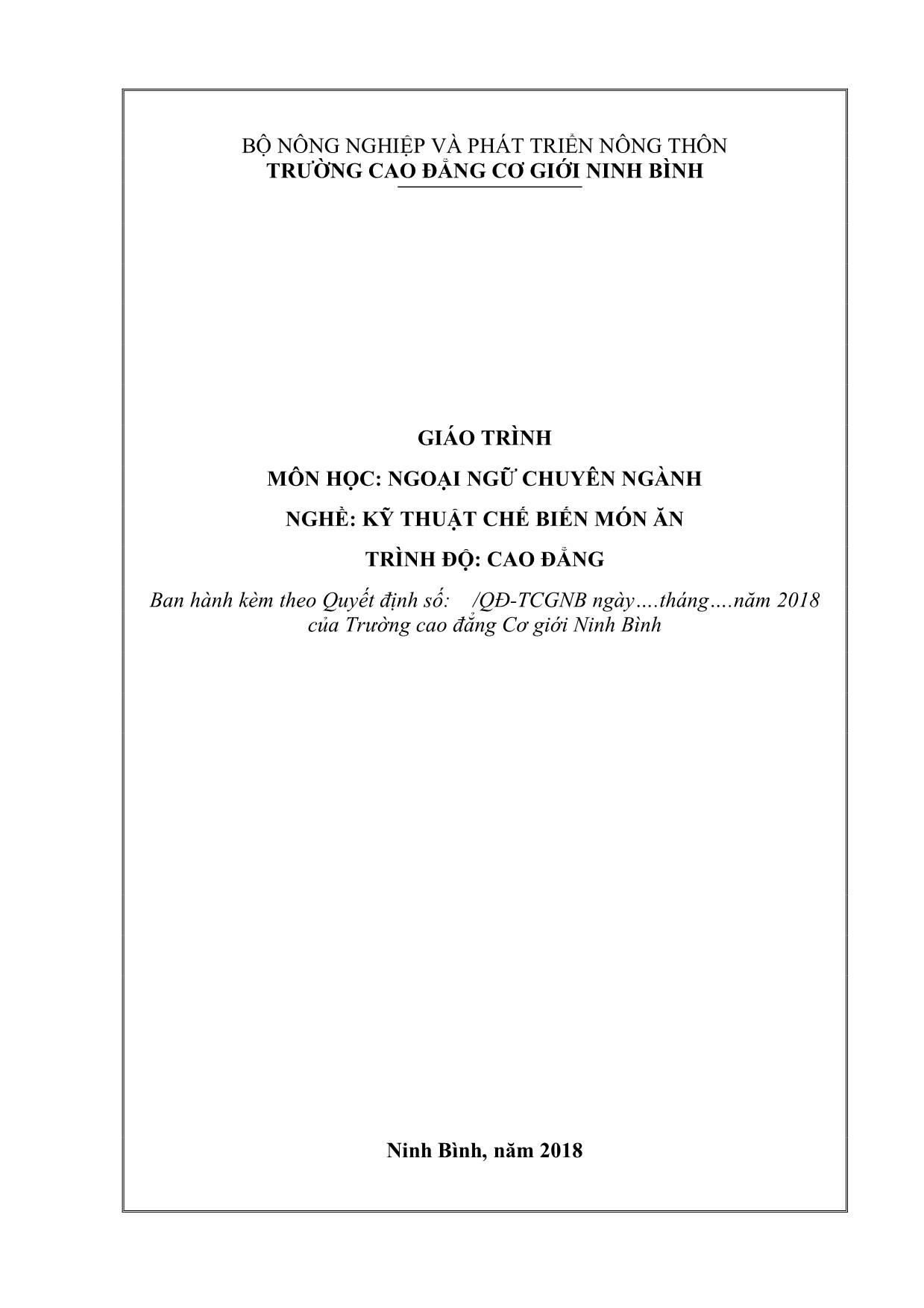
Trang 1
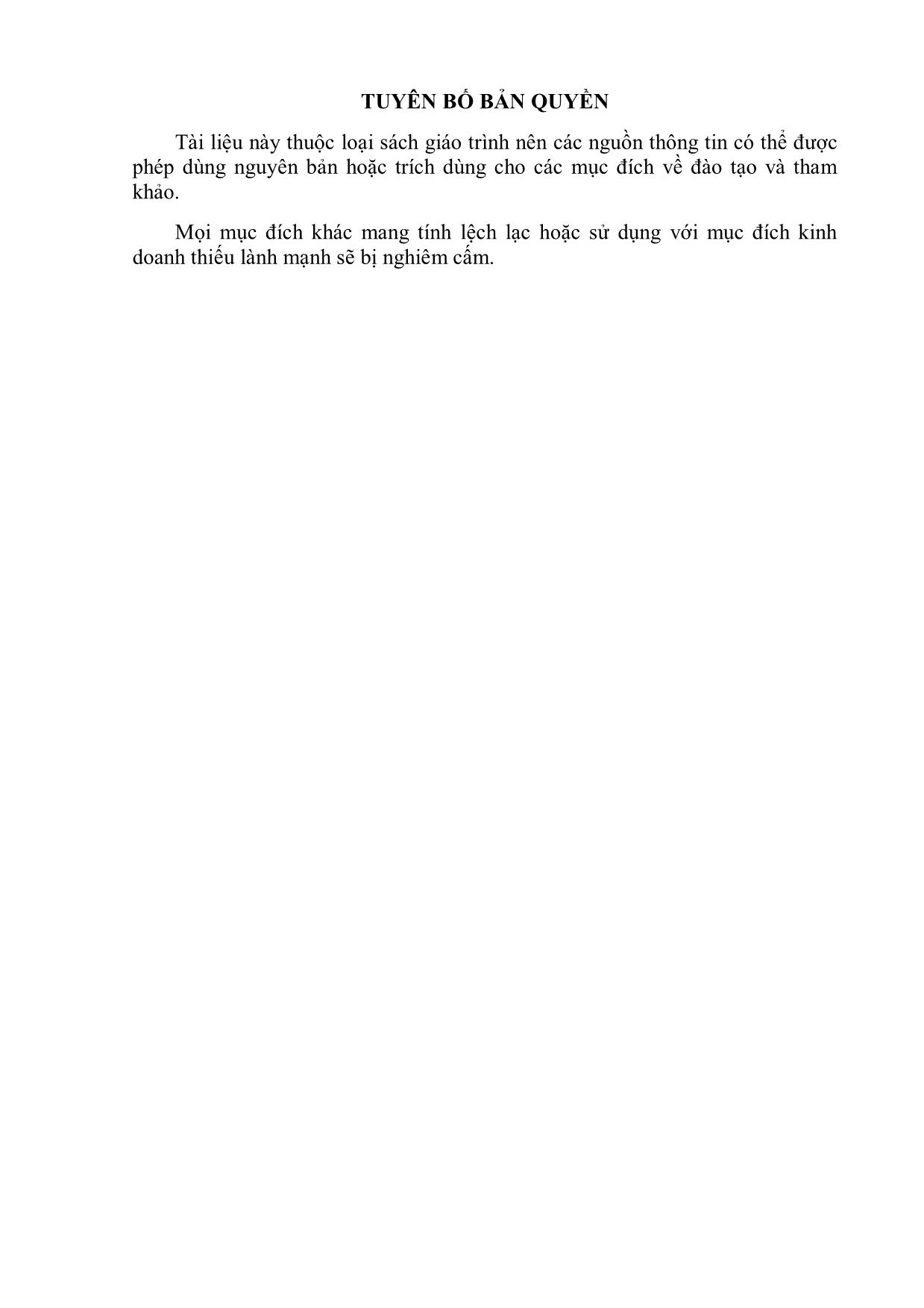
Trang 2
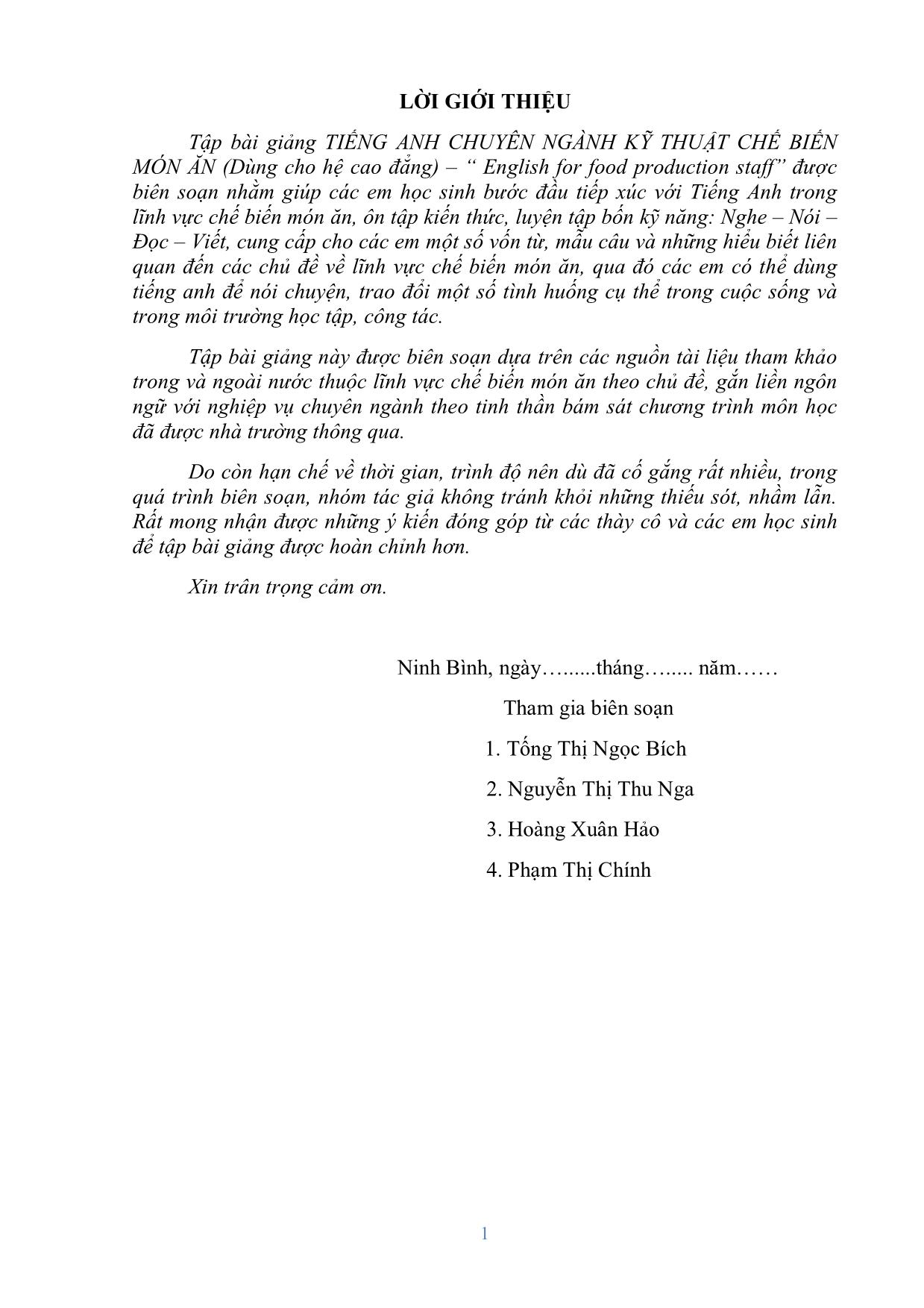
Trang 3
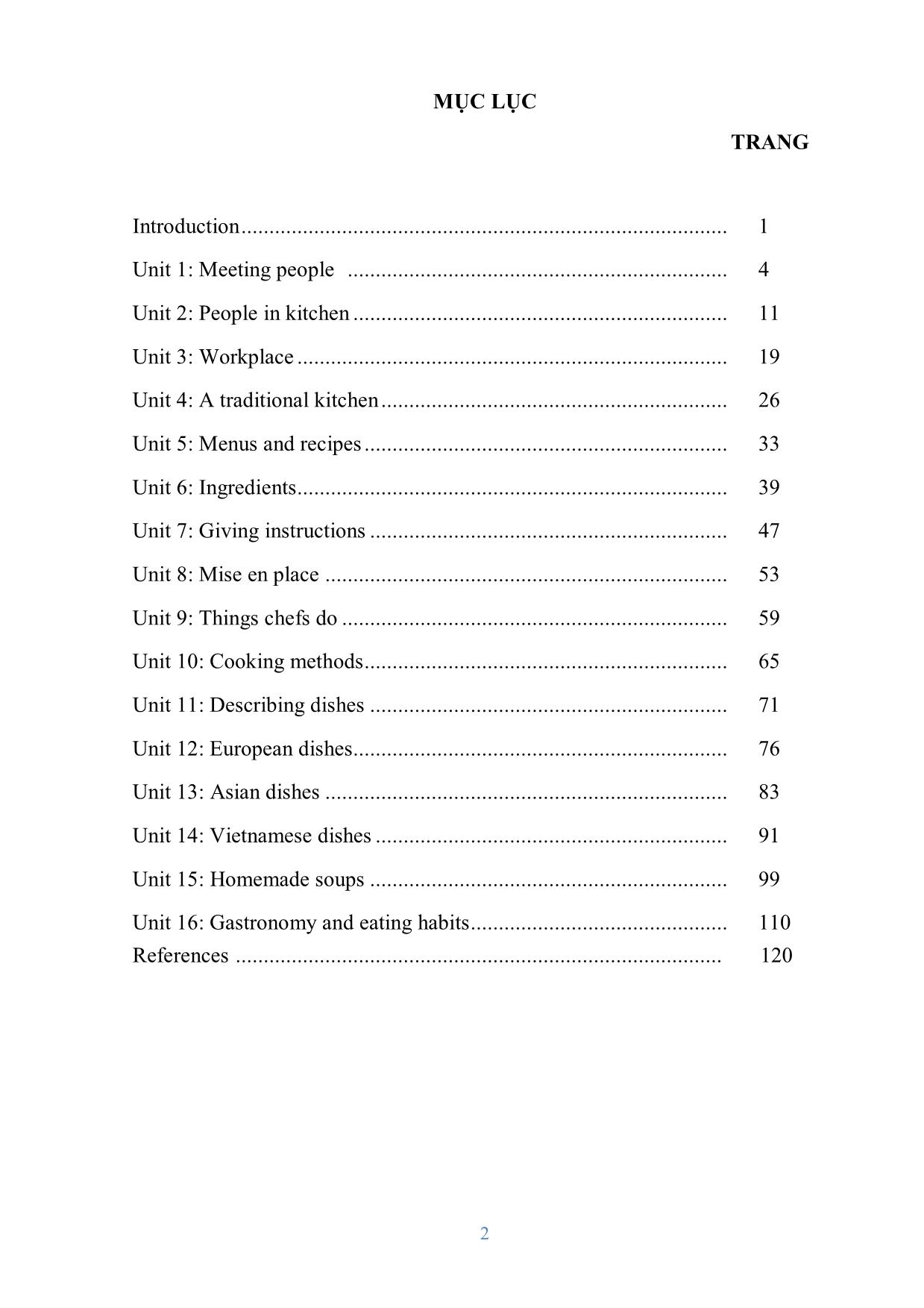
Trang 4
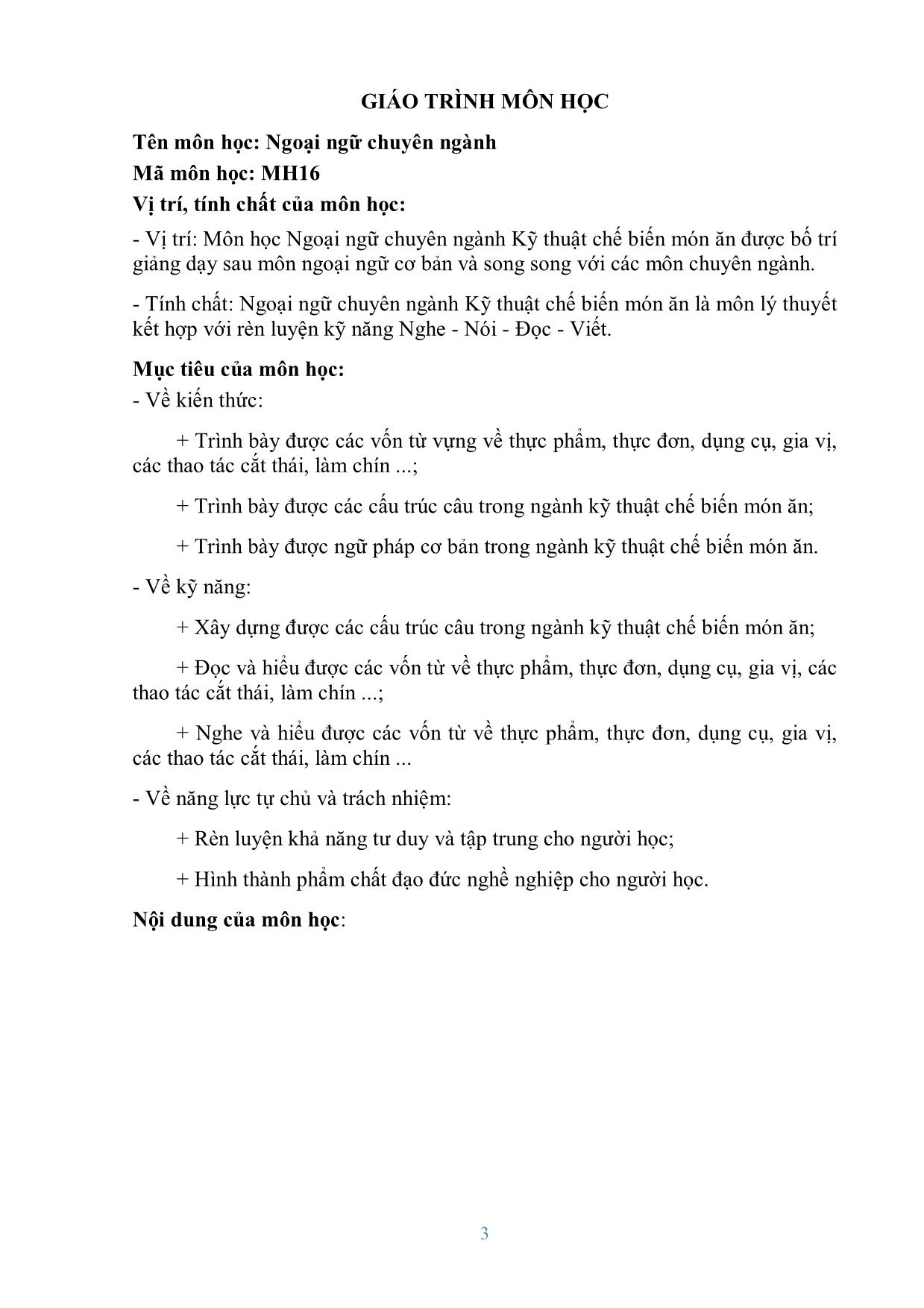
Trang 5
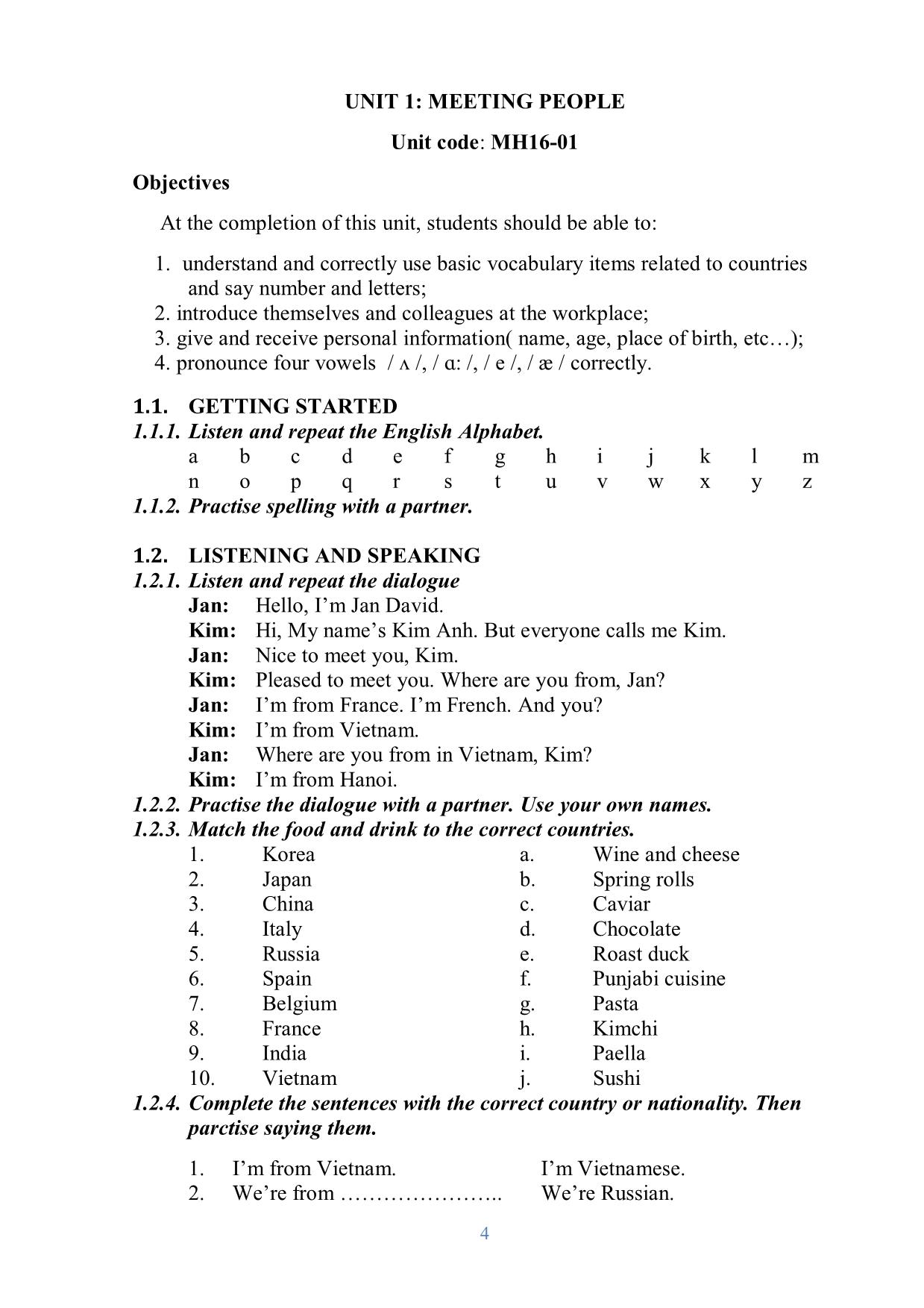
Trang 6
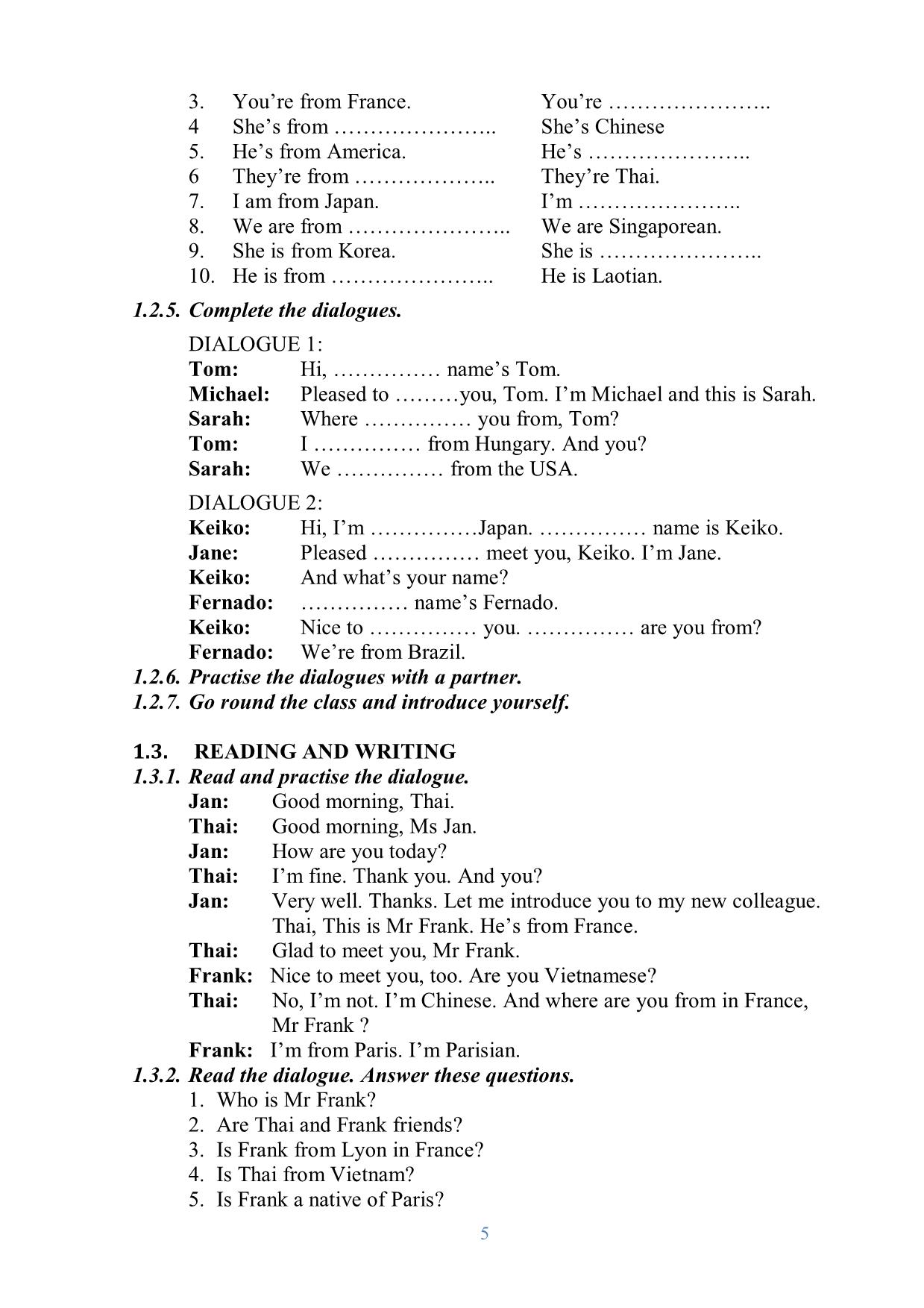
Trang 7
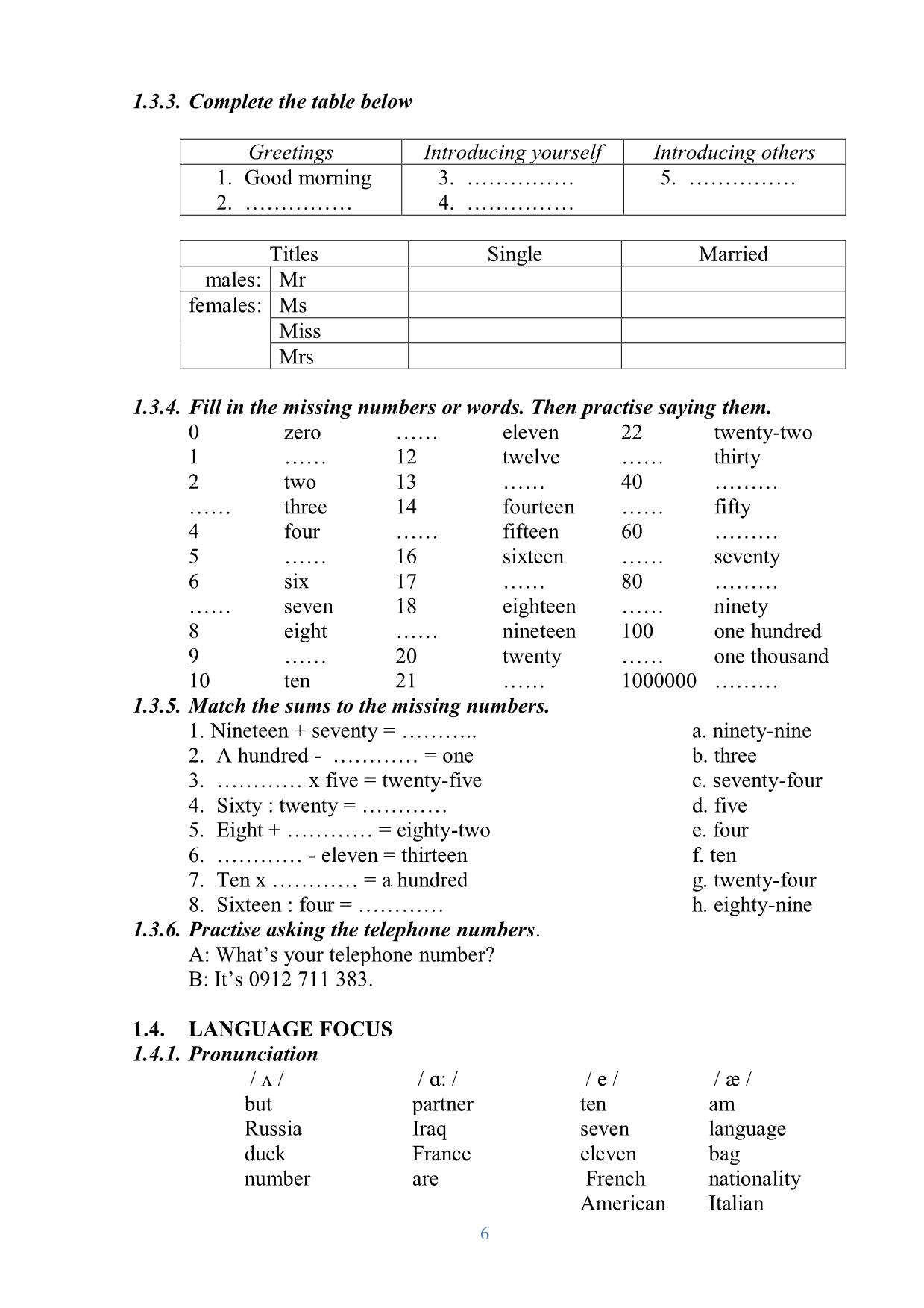
Trang 8
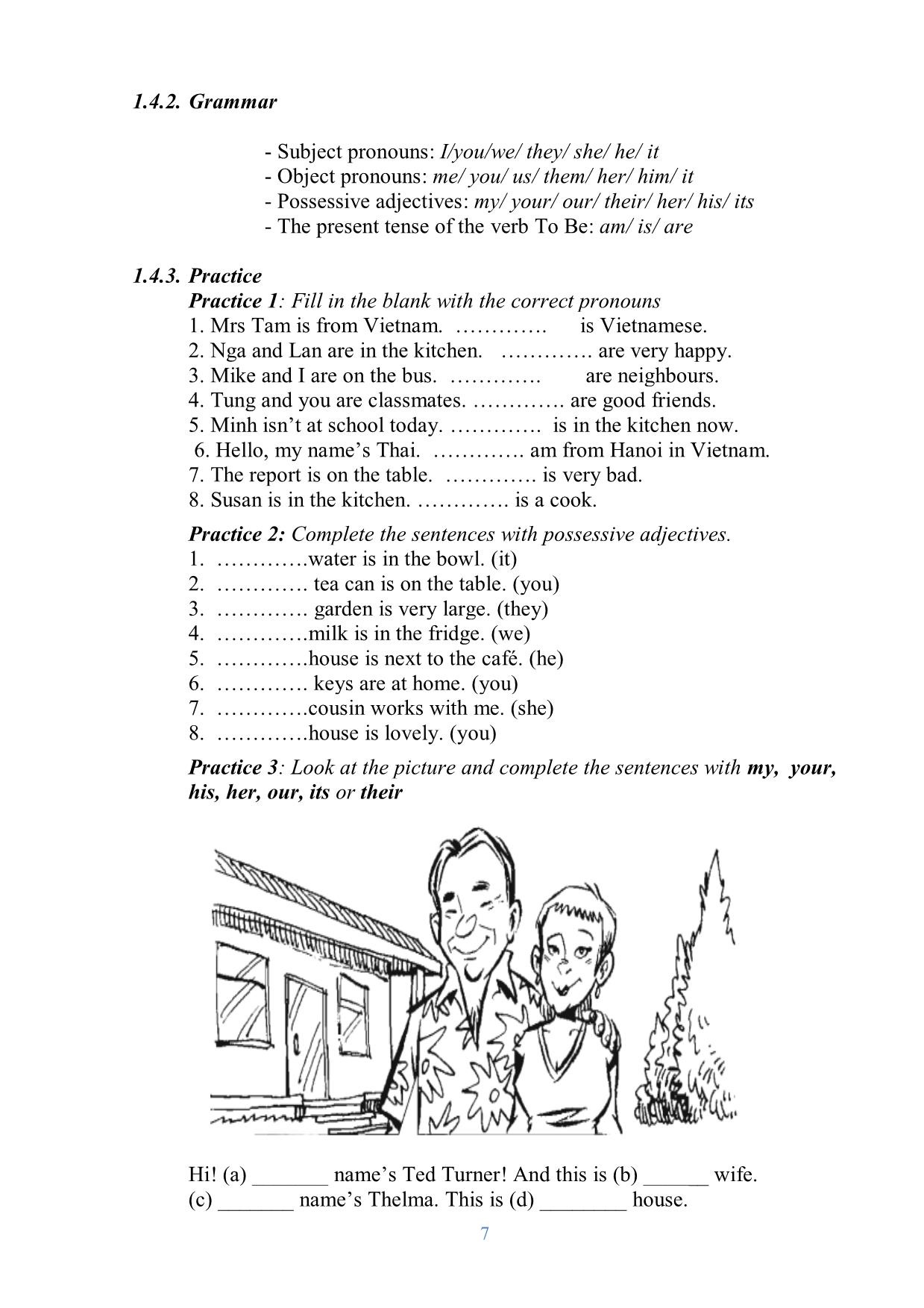
Trang 9
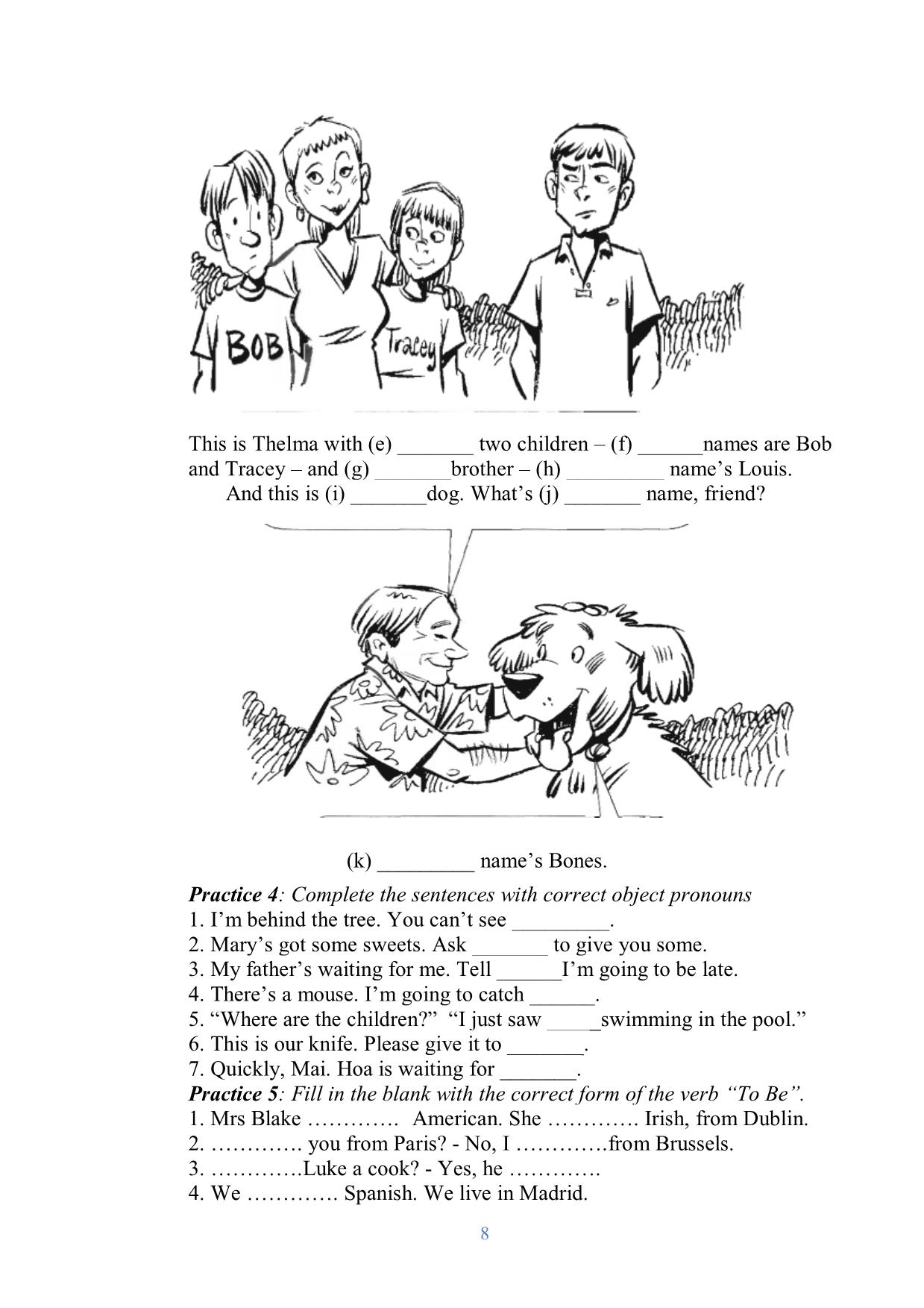
Trang 10
Tải về để xem bản đầy đủ
Bạn đang xem 10 trang mẫu của tài liệu "Giáo trình Kỹ thuật chế biến món ăn - Ngoại ngữ chuyên ngành", để tải tài liệu gốc về máy hãy click vào nút Download ở trên
Tóm tắt nội dung tài liệu: Giáo trình Kỹ thuật chế biến món ăn - Ngoại ngữ chuyên ngành
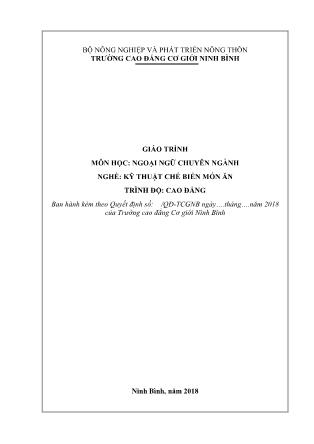
BỘ NÔNG NGHIỆP VÀ PHÁT TRIỂN NÔNG THÔN TRƯỜNG CAO ĐẲNG CƠ GIỚI NINH BÌNH GIÁO TRÌNH MÔN HỌC: NGOẠI NGỮ CHUYÊN NGÀNH NGHỀ: KỸ THUẬT CHẾ BIẾN MÓN ĂN TRÌNH ĐỘ: CAO ĐẲNG Ban hành kèm theo Quyết định số: /QĐ-TCGNB ngày.tháng.năm 2018 của Trường cao đẳng Cơ giới Ninh Bình Ninh Bình, năm 2018 TUYÊN BỐ BẢN QUYỀN Tài liệu này thuộc loại sách giáo trình nên các nguồn thông tin có thể được phép dùng nguyên bản hoặc trích dùng cho các mục đích về đào tạo và tham khảo. Mọi mục đích khác mang tính lệch lạc hoặc sử dụng với mục đích kinh doanh thiếu lành mạnh sẽ bị nghiêm cấm. LỜI GIỚI THIỆU Tập bài giảng TIẾNG ANH CHUYÊN NGÀNH KỸ THUẬT CHẾ BIẾN MÓN ĂN (Dùng cho hệ cao đẳng) – “ English for food production staff” được biên soạn nhằm giúp các em học sinh bước đầu tiếp xúc với Tiếng Anh trong lĩnh vực chế biến món ăn, ôn tập kiến thức, luyện tập bốn kỹ năng: Nghe – Nói – Đọc – Viết, cung cấp cho các em một số vốn từ, mẫu câu và những hiểu biết liên quan đến các chủ đề về lĩnh vực chế biến món ăn, qua đó các em có thể dùng tiếng anh để nói chuyện, trao đổi một số tình huống cụ thể trong cuộc sống và trong môi trường học tập, công tác. Tập bài giảng này được biên soạn dựa trên các nguồn tài liệu tham khảo trong và ngoài nước thuộc lĩnh vực chế biến món ăn theo chủ đề, gắn liền ngôn ngữ với nghiệp vụ chuyên ngành theo tinh thần bám sát chương trình môn học đã được nhà trường thông qua. Do còn hạn chế về thời gian, trình độ nên dù đã cố gắng rất nhiều, trong quá trình biên soạn, nhóm tác giả không tránh khỏi những thiếu sót, nhầm lẫn. Rất mong nhận được những ý kiến đóng góp từ các thày cô và các em học sinh để tập bài giảng được hoàn chỉnh hơn. Xin trân trọng cảm ơn. Ninh Bình, ngày......tháng..... năm Tham gia biên soạn 1. Tống Thị Ngọc Bích 2. Nguyễn Thị Thu Nga 3. Hoàng Xuân Hảo 4. Phạm Thị Chính 1 MỤC LỤC TRANG Introduction ....................................................................................... 1 Unit 1: Meeting people .................................................................... 4 Unit 2: People in kitchen ................................................................... 11 Unit 3: Workplace ............................................................................. 19 Unit 4: A traditional kitchen .............................................................. 26 Unit 5: Menus and recipes ................................................................. 33 Unit 6: Ingredients............................................................................. 39 Unit 7: Giving instructions ................................................................ 47 Unit 8: Mise en place ........................................................................ 53 Unit 9: Things chefs do ..................................................................... 59 Unit 10: Cooking methods................................................................. 65 Unit 11: Describing dishes ................................................................ 71 Unit 12: European dishes................................................................... 76 Unit 13: Asian dishes ........................................................................ 83 Unit 14: Vietnamese dishes ............................................................... 91 Unit 15: Homemade soups ................................................................ 99 Unit 16: Gastronomy and eating habits.............................................. 110 References ....................................................................................... 120 2 GIÁO TRÌNH MÔN HỌC Tên môn học: Ngoại ngữ chuyên ngành Mã môn học: MH16 Vị trí, tính chất của môn học: - Vị trí: Môn học Ngoại ngữ chuyên ngành Kỹ thuật chế biến món ăn được bố trí giảng dạy sau môn ngoại ngữ cơ bản và song song với các môn chuyên ngành. - Tính chất: Ngoại ngữ chuyên ngành Kỹ thuật chế biến món ăn là môn lý thuyết kết hợp với rèn luyện kỹ năng Nghe - Nói - Đọc - Viết. Mục tiêu của môn học: - Về kiến thức: + Trình bày được các vốn từ vựng về thực phẩm, thực đơn, dụng cụ, gia vị, các thao tác cắt thái, làm chín ...; + Trình bày được các cấu trúc câu trong ngành kỹ thuật chế biến món ăn; + Trình bày được ngữ pháp cơ bản trong ngành kỹ thuật chế biến món ăn. - Về kỹ năng: + Xây dựng được các cấu trúc câu trong ngành kỹ thuật chế biến món ăn; + Đọc và hiểu được các vốn từ về thực phẩm, thực đơn, dụng cụ, gia vị, các thao tác cắt thái, làm chín ...; + Nghe và hiểu được các vốn từ về thực phẩm, thực đơn, dụng cụ, gia vị, các thao tác cắt thái, làm chín ... - Về năng lực tự chủ và trách nhiệm: + Rèn luyện khả năng tư duy và tập trung cho người học; + Hình thành phẩm chất đạo đức nghề nghiệp cho người học. Nội dung của môn học: 3 UNIT 1: MEETING PEOPLE Unit code: MH16-01 Objectives At the compl ... Chinese food, sushi or some tasty hot pizza. However, I like trying cuisine of different countries. My parents travel a lot and mom always brings recipes of national cuisine of those countries that they visit. At home she tries to cook it – It’s really good for a change. I like the saying very much: “We should always remember that we eat to live but not live to eat”. Finally, there are three main messages to follow for healthy eating: First, we should eat less fat, particularly saturated fat. Secondly, we are to cut down on sugar and salt. Thirdly, we must eat more fresh fruit and vegetables. 16.3.2. Read the passages then match the title to the passage. THE MEDITERRANEAN DIET 1 . Olive oil 2. Oily fish 3. Secrets of the Mediterranean Diet 4. Wine in moderation 5. The secret ingredients 6. Protection from chronic diseases 7. Fruit and vegetables 8. Times are changing 9. Combined effect A recent study has once again confirmed that people who closely follow ‘the Mediterranean Diet’ live longer than other Europeans. So what exactly is the Mediterranean diet and how does it exert this spectacular effect.The Mediterranean diet is not a specific diet plan or diet program but a collection of eating habits that are traditionally followed by the people of the Mediterranean region. There are at least 16 countries bordering the Mediterranean Sea and food habits vary between these countries according to culture, ethnic background and religion. But there are a number of characteristics common to them all. A high consumption of fruits, vegetables, potatoes, beans, nuts, seeds, bread and other cereals. In a recent study the diets of more than 22,000 people living in Greece were ranked according to how closely they adhered to the traditional Greek style Mediterranean diet. During the 4 years of the study, it was found that the closer people followed the traditional diet the less likely they were to die from either heart disease or cancer, with slightly greater protection against heart disease than cancer. Overall, people following the Mediterranean diet most closely were 25% less likely to die during the study period than those who did not, suggesting that those closely following the Mediterranean diet end up dying later than those who do not. 114 Since mortality statistics first identified that Mediterranean populations were living longer than other Europeans, scientists have been trying to deduce which components of the Mediterranean diet are responsible for its considerable benefits. Here are some of the candidates so far... Olive oil is first choice for investigation as it is used almost exclusively in Mediterranean cooking instead of butter, margarine and other fats. Olive oil is a rich source of monounsaturated fat, which is protective against heart disease, possibly because it displaces saturated fat from the diet. Olive oil is also a source of antioxidants including vitamin E. But it is important to remember that olive oil is used to prepare vegetable dishes, tomato sauces, salads and to fry fish. A high intake of fresh fruit and vegetables has been shown to be protective against both heart disease and cancer; probably because of the antioxidants they contain. Tomatoes have come under particular scrutiny because they feature so heavily in Mediterranean food. Tomatoes are indeed a major source of antioxidants and heat processing such as cooking, as in the preparation of tomato sauces is recommended as it increases the availability of lycopene, one of the main antioxidants in tomatoes. It has also been suggested that fish, in particular oily fish such as sardines, have important health benefits. Oily fish are a source of omega-3 polyunsaturated fats and the complex long chain derivatives of these fats appear to be particularly beneficial to heart health because of their anti-inflammatory and vasodilatory properties, which keeps blood flowing smoothly. Throughout the Mediterranean wine is drunk in moderation and usually taken with meals. For men moderation is two glasses per day, for women one glass per day. Wine, especially red wine, contains a vast array of plant compounds with health-promoting qualities called phy to nutrients. Among them, polyphenols, which are powerful antioxidants, protect against LDL oxidation and other pathologic sequelae of the oxidative process. Other phytonutrients play a role in the inhibition of platelet aggregation, vasodilation,etc. In the Greek study individual components or food groups of the Mediterranean diet did not provide any significant protection. In practice it is likely that a combination of all the different ingredients of the diet make it so healthy. Not only that but other factors such as a more relaxed attitude to eating, plenty of sunshine and more physical activity are likely to be contributing to the overall healthy lifestyle in this region. But times are changing and nowadays fewer people have the lifestyle to follow the traditional diet. Professor Lluis Serra, President of The Foundation for the Advancement of the Mediterranean Diet believes this is both an opportunity and a threat. ‘Sociological changes mean that 115 people are less likely to spend time in the kitchen preparing food, but at the same time it is a great opportunity for catering outlets and restaurants, especially as Mediterranean people now know that their traditional fare is very healthy’ he said. 16.3.3. Write about Vietnamese Cuisine or gastronomy. Choose one of the following topics: - Overview on Vietnam gastronomy - Specialities of three regions: the north, the middle, the south. - One of the typical Vietnamese family meal - One of the popular Vietnamese dish 16.4. LANGUAGE FOCUS 16.4.1. Pronunciation - The IPA: vowels The vowels sounds are organised into the following different groups: Short vowels I ʊ ʌ ɒ ə e æ Long vowels i: u: ɑ: ɔ: ɜ: Diphthongs (double vowel sounds) iə ʊə ai ɔi əʊ eə aʊ ei 16.4.2. Grammar Conditionals 16.4.3. Practice Practice1: Put the verbs into the correct form: Conditional - type I. 1. If you ........... (repair) my bike, I will help you with the Maths homework. 2. It ...........(be) too hot if he travels to Greece in August. 3. If Peter sits on the sofa, his sister...........(sit) next to him. 4. The policeman...........(tell) you the way if you ask him. 5. If it...........(snow) in the Alps, it will rain in Munich. 6. If you add some tomatoes, the sauce...........(taste) much better. 7. If Tom...........(pull) this string, he will open the box. 8. If I find Simon's mobile, I...........(take) it to the office. 9. We ...........(get) lost if we forget the town map. Practice2: Put the verbs into the correct form: Conditional - type II. 116 1. If I ...........(come) home earlier, I would prepare dinner. 2. If we lived in Rome, Francesco...........(visit) us. 3. If Tim and Tom ...........(be) older, they would play in our hockey team. 4. If he...........(be) my friend, I would invite him to my birthday party. 5. If Susan...........(study) harder, she would be better at school. 6. If they had enough money, they...........(buy) a new car. 7. If you did a paper round, you...........(earn) a little extra money. 8. If Michael...........(get) more pocket money, he would ask Doris out for dinner. 9. If we...........(hurry), we would catch the bus. 10. If it rained, Nina...........(take) an umbrella with her. Practice3: Put the verbs into the correct form: Conditional - type III 1. If the weather...........(be) nice, they would have played football. 2. If we had gone to a good restaurant, we...........(have) a better dinner. 3. If John...........(learn) more words, he would have written a good report. 4. If the boys ........... (take) the bus to school, they would have arrived on time. 5. If the teacher had explained the homework, I...........(do) it. 6. If they had waited for another 10 minutes, they...........(see) the pop star. 7. If the police...........(come) earlier, they would have arrested the burglar. 8. If you had bought fresh green vegetable, your salad...........(taste) better. 9. If Alex had asked me, I ........... (email) the documents. 10. If he ........... (speak) slower, Peggy would have understood him. Practice4: Choose the best answers 1. If the train is late, we _______ to the office. A. walk B. will walk C. would walk D. walks 2. She _______ if she has time. A. calls B. would call C. will call D. calling 3. If it _______ too much, I will buy the smaller one. A. costs B. will cost C. would cost D. cost 4. If the class _______ full, we will find another one. A. are B. will be C. were D. is 5. What will we do if the taxi _______? A. don’t come B. didn’t come C. doesn’t come D. had not come 6. If it snowed this summer, we _______ skiing. A. goes B. will go C. would go D. go 7. If you drove more carefully, you _______ so many accidents. A. would not have B. will not have C. wouldn’t have had D. has 8. If he _______ up earlier, he’d get to work on time. A. gets B. will get C. got D. had got 9. I would tell you more about it if we _______ more time. A. has B. will have C. have D. had 10. If I _______ so busy yesterday, I would have visited you. A. were not B. wasn’t C. aren’t D. hadn’t been 117 11. If you had seen the film, you _______ it. A. will enjoy B. would have enjoyed C. would enjoy D. enjoyed 12. If he had been more careful, he_______ an accident. A. would not have had B. will not have C. does not have D. would not have 13. I’ll do it if he_______ me. A. asking B. will ask C. asked D. asks 14. I wouldn’t have believed it if I_______ it with my own eyes. A. not to see B. didn’t see C. don’t see D. hadn’t seen 15. What _______ if you found a burglar in your house? A. will you do B. do you do C. would you do D. you do Practice5: Choose the best answers 1. If I _______ him, I_______ him a lift. A. see/ would give B. saw/ will give C. see/ will give D. had seen/ will give 2. The table _______ if you_______ on it. A. will collapse / stand B. would collapse / stand C. would have collapsed / stood D. collapses/ had stood 3. If I _______ your passport, I_______ you at once. A. found/ will telephone B. find/ would telephone C. had found/ would have telephone D. find/ will telephone 4. If he_______ my car more carefully, I_______ him $10. A. washes/ would give B. washes/ will give C. washed/ will give D. washes/ would have given 5. I. _______ very angry if he_______ any more mistakes. A. am/ made B. were/ made C. would be/ makes D. will be/ makes 6. If he_______ late, we _______ without him. A. comes/ would go B. comes/ will go C. had come/ would go D. came/ will go 7. He _______ late for the train if he_______ at once. A. would be/ doesn’t start B. will be/ doesn’t start C. would have been/ didn’t start D. is / hadn’t started 8. If you _______ late, they_______ you in. A. arrive/ would not let B. arrived/ wouldn’t let C. had arrived/ wouldn’t let D. to arrive/ would not let 9. If she ______ to the party last night, She ________many of her old friends at high school. A. have gone / would met B. had gone / would met C. had gone / would have met D. had gone / will meet 10. If I ________a lot of money now, I ________a new car. A. have/ will buy B. have/ would buy C. had/will buy D. had/would buy 11. if I ________you, I ________do that. 118 A. am/will B. were/would C. were/will D.had been/would 12. I_______ a taxi if I _______ that it was a long way. A. will take/ realizes B. would take/ doesn’t realize C. wouldn’t have taken/ had realized D. wouldn’t take/ realized 13. If he___tickets yesterday, he ___ on the beach now. A. had booked/ would be lying B. had booked/ would have lied C. booked/ would lie D. books/ will lie 14. If I ___ as young as you are, I ___ in a boat round the world. A. were/ would sail B. would be / would sail C. were/ will sail D. would/ would sail 15. If you ___ less last night, you ___ so bad today. A. had drunk- would not have felt B. drank- would not feel C. had drunk- would not feel D. would have drunk- would not feel Practice 6: Correct the sentences 1. if I am 10 centimeters taller, I would play basketball. 2. if I were you, I will go to the dentist’s and have tooth checked 3. if the weather is fine today, we would go to the beach 4. if you will study harder, you will surely pass the coming exams with good results 5. if I would have studied Russian at school, I would have understood him easily 6. if tomorrow the weather will be bad, the match will be postponed 7. if you will see Mike today, please ask him to phone me 8. if the weather wasn’t too bad, we would to go swimming 9. if drivers obeyed the speed limit, fewer accidents occur 10. what would happen because I pressed that red button? 16.5. KEY VOCABULARY gastronomy diet porridge cornflake crambled eggs pancake red beet supper pastry-rolls buns junk food alcoholic drinks flavor savory tart bitter nuts seeds beans feta cheese cereals habit taste taro cassava yam tofu bok choy daikon breadfruit callaloo couscous bulgur 119 REFERENCES [1] Anne Baude, Montserrat lglesias, Anna Inesta - Ready to Order: English for the Resstaurant Industry. Pearson Education Limited, 2002 [2] Elizabeth Riely, The Chef’s Companion: Grammar: Beginner, New Editions, 2005 [3] Hanoi Tourism College, English for kitchen Staff, Tập bài giảng cho hệ nghề Chế biến món ăn, 2003 [4] Jack C.Richards, New Interchange: English for Internation Communication, Cambridge University Press, 2000 [5] Micheael Swan, Practical English Usage, Oxford University Press, 1995 [6] Tom Hutchinson, Lifelines Elementary, Oxford University Press, 2002 [7] Trish Stott - Rod Revell, Highly Recommended: English for the hotel and catering industry, Oxford University Press, 2004 [8] Vietnam Human Resources Development in Tourism Project, Vietnam Tourism Occupational Skill Standards: Wastern Fodd Preparation, June, 2006 [9] Vietnam Tourism Certification Board, Professional Cookery Skill, Thế giới Publishers, 2004 [10] Công ty du lịch Hà Nội - Công thức món ăn Việt Nam - Âu, 1987 [11] Nguyễn Thành Yến (Biên dịch), Tiếng Anh cho đầu bếp, NXB Tổng hợp Tp Hồ Chí Minh, 2005 [12] Tổng cục du lịch: Giáo trình nghiệp vụ nấu ăn, Cách tiếp cận thực tế, Lux-Development và TCDL, 2000 [13] Trường Cao đẳng Du lịch Hà nội, Giáo trình kỹ thuật chế biến món ăn, NXB Công an nhân dân, 2005 120
File đính kèm:
 giao_trinh_ky_thuat_che_bien_mon_an_ngoai_ngu_chuyen_nganh.pdf
giao_trinh_ky_thuat_che_bien_mon_an_ngoai_ngu_chuyen_nganh.pdf

